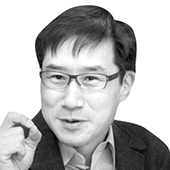The secret of success
이 글자크기로 변경됩니다.
(예시) 가장 빠른 뉴스가 있고 다양한 정보, 쌍방향 소통이 숨쉬는 다음뉴스를 만나보세요. 다음뉴스는 국내외 주요이슈와 실시간 속보, 문화생활 및 다양한 분야의 뉴스를 입체적으로 전달하고 있습니다.

Hasok Chang The author is a professor of history and philosophy of science at the University of Cambridge.
The 21st century is an age of information and technology. Without IT that encompass computers, smart phones, the internet and AI, not only industries but also our daily lives would be impossible. Out of a sense of crisis that falling behind in international competitiveness in these rapidly developing fields would lead to economic ruin, many people champion the significance of enhancing scientific creativity — the basis of technology — through education.
Who are the people who developed these innovative technologies? There are three legendary figures in the IT industry: Steve Jobs who made the Apple computer, Bill Gates who founded Microsoft, and Mark Zuckerberg who created Facebook. They did not start as entrepreneurs, but personally worked on technological ideas, started their companies and became rich with technological creativity. Interestingly, they are all college dropouts. Would Korean parents let their children quit school to pursue a business with no prospect? Gates and Zuckerberg, especially, dropped out of none other than Harvard University, one of the hardest schools to enter.
The three pioneers could attain extraordinary accomplishments thanks to the nature of IT, but their success is deeply associated with the essence of scientific and technological knowledge. Charles Darwin, famous for the theory of evolution, graduated from the University of Cambridge, but he did not excel academically. Upon graduating, he traveled the world instead of getting a job, spent his family fortune, and lived in the countryside for his own research. Albert Einstein could not get a professorship at first and worked at the Patent Office in Switzerland, where he made revolutionary accomplishments including the theory of relativity.
Thomas Edison was a wanderer who learned different things from childhood, started improvised businesses and became the most famous inventor of all time. If talent were searched for and selected on the national level, they would not have made the cut.
The research of creating new knowledge is not a race of setting a goal and dashing for it. As you research and explore, your goal itself can change, and in the course of seeking the answer, the question itself will constantly modify. Technological development is similar. People in the past dreamt of going to the moon when they imagined what the future would be like. But not many had thought of the internet, smartphones or social media, because such concepts did not exist before. For innovative development, it is more important to ask new questions than answering existing ones. Already known facts should be seen in new ways. That’s creativity.
To have truly different perspectives, you actually need to live your life a bit differently from others. If you look at the people who made creative accomplishments, not many have lived exemplary lives of producing good outcomes constantly without any failures. In the social level, standardization should be rejected, and different people should be accepted. It is important to pursue diversity based on tolerance and liberty and facilitate exchanges among heterogeneous groups.
Koreans envy and catch up with latest science and technology in the advanced countries, but what’s missing in most of such discussions is the role of immigrants. In many developed countries, especially the United States, immigrants and their children from around the world played tremendously creative roles. The UK and France had similar experiences. Can you imagine the scientific tradition of Germany without Jewish people?
Of course, not everyone who leads unusual life succeeds. But if we hope one in 100 develops something extraordinary for the society, we need to embrace failures of 99. The formidable power of America comes from the social atmosphere of encouraging and embracing people who failed.
People who pursued an extraordinary dream and failed to realize it still can enjoy everyday happiness as ordinary citizens without a sense of self-torment or obsession. Whether singing in the local choir or engaging in meaningful volunteer works, many who did not make extraordinary success live meaningful lives.
How can we get through the fourth industrial revolution and lead the world in the new era? We need to reconsider the question itself. Ironically, if you want to lead the fourth industrial revolution, you should stop obsessing over the fourth industrial revolution. Let’s stop the behavior of everyone clinging to a certain “keywords” and chasing the “trend.” It is hard for fresh creativity to spring up from totalitarianism or mob psychology. To display creativity beyond the correct answer, we need to live our lives that don’t fit the correct answer. The model of an exemplary student who academically excels, graduates from a top university and gets a stable job is not even close. If we really hope for extraordinary creativity, we first need to make our society more generous in embracing peculiar lives.
Translation by the Korea JoongAng Daily staff.
Copyright © 코리아중앙데일리. 무단전재 및 재배포 금지.